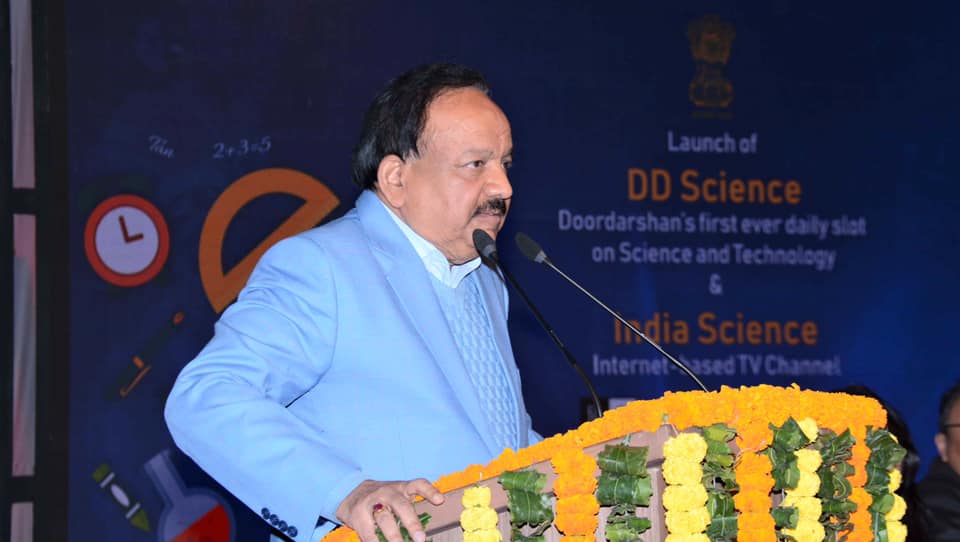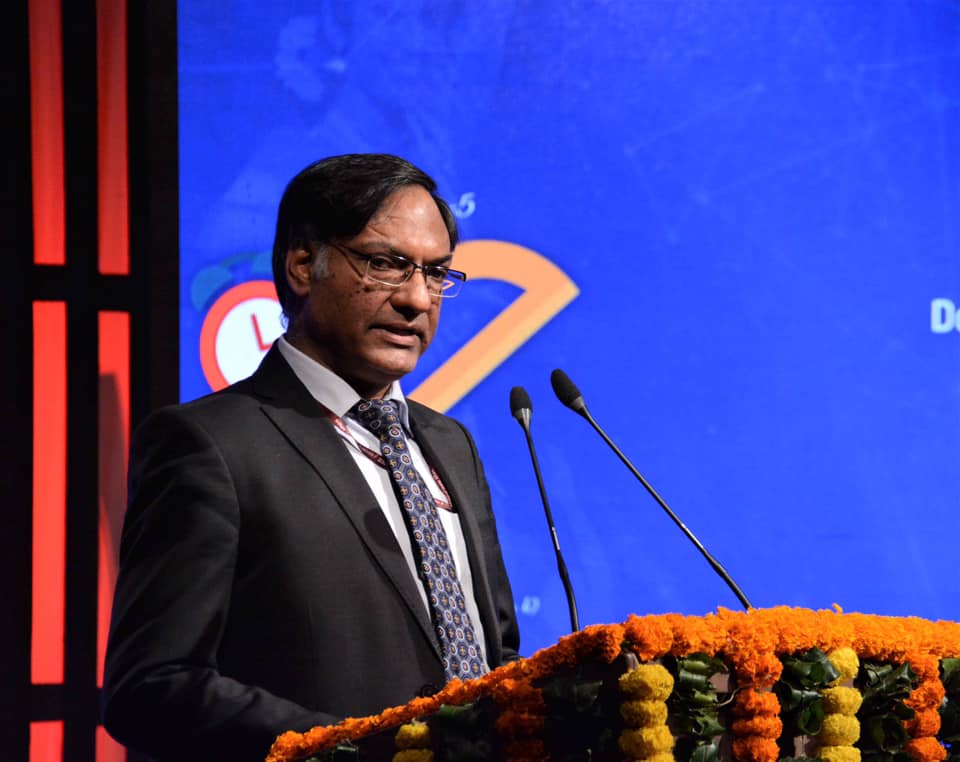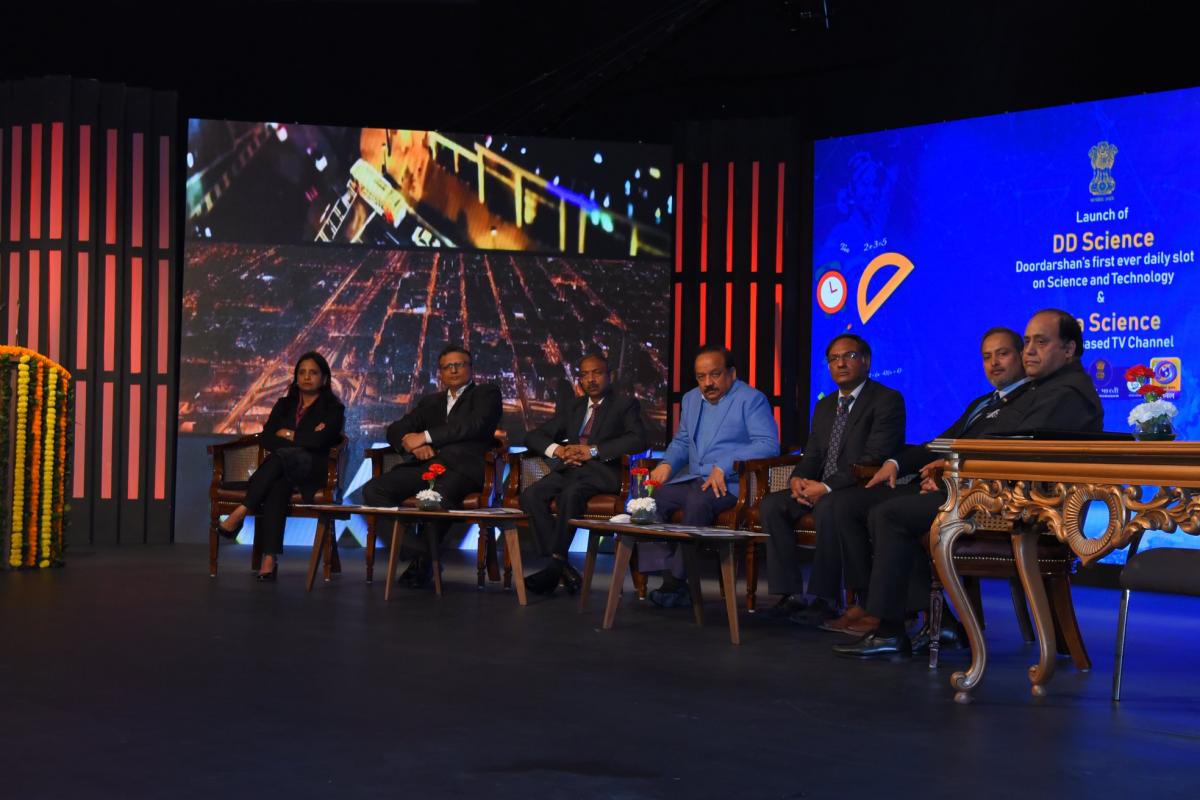प्रेस विज्ञप्ति
The India – Sweden Collaborative Industrial Research & Development Programme supported by the Government of India and Sweden was launched by Prof. Ashutosh Sharma, Secretary, Department of Science and Technology and H E Klas Molin, Ambassador of Sweden to India at the ‘AI for All summit’, an India-Sweden partnership event at New Delhi.
The launch of this collaboration is in line with Niti Aayog’s National Policy on Artificial Intelligence (AI) ‘AIforAll’ which focuses on harnessing collaborations and partnerships, and aspires to ensure prosperity for all. ‘AIforAll’ means technology leadership in AI for achieving the greater good.
Marching towards this direction, a discussion was held on using AI to address global challenges by Swedish & Indian stakeholders from public & private sector during the event.
In his keynote address, Shri Amitabh Kant, CEO, Niti Aayog talked about the vision document on ‘ÁIforAll’ and said that artificial intelligence could serve India’s needs in areas like medical and health services, agriculture, smart cities, smart industries, security infrastructure and so on.
“With proactive government initiatives, robust startup and innovation ecosystem, India offers unique solutions which cater to a diverse demography, and these can help it become the AI hub for the World. It can produce AI technologies which can be applied at scale and replicated across nations,” he added.
“India’s data diversity is a big draw for global AI implementers as data is the fuel that powers current generation AI algorithms utilising deep learning,” he further pointed out.
Prof Ashutosh Sharma stressed about a road map in AI and elaborated how DST could work with Sweden on several focus areas for India.
He mentioned that creation of data hubs, convergence of technologies and collaborations with the countries in different related areas can help leverage AI for benefit of society.
"The India-Sweden Collaborative Industrial Research and Development Programme will see Swedish and Indian innovators work together and develop solutions that benefit both sides," Klas Molin, said.
He added that India, with its strong talent pool and scale with over a billion people, will play an important role for developing solutions that can address challenges related to healthcare, transportation and public safety.
The objective of the programme is to promote, facilitate and support co-development and commercialization of innovative technologies which can benefit both India and Sweden. This Programme is being implemented by Global Innovation & Technology Alliance (GITA) on behalf of DST in India, and Vinnova in Sweden.
The launch of the Programme coincided with the launch of the 1st Request for Proposals 2019 with the following areas of focus:
1. Smart Cities and Clean Technologies, including but not limited to:
- Transport & mobility; Electrical vehicles, Autonomous vehicles, Traffic safety, Mobility as a service, Reduction in traffic congestion, Digital solutions, etc.
- Environmental technologies; Eco–system services, Clean water and air, Waste management, Renewable energy, etc.
- Circular and bio-based economy; Bio-based materials, Bio-fuels, Resource efficiency in consumption and production, Waste-to-wealth, etc.
- Energy; Reduced energy consumption and carbon dioxide emissions, Alternative fuels and mobile energy sources, Renewable energy, Energy storage, Resource-efficient infrastructure planning, etc.
- City planning; ICT for urban technical supply, Geodata, tools for dialogue with citizens, etc.
2. Digitalisation and Internet of Things (IoT)
Indian industry can avail funding up to INR 1.5 Cr (USD 250,000 approx.) per project for co-development of technologies with Sweden. Government’s contribution would be match funded by the Indian Industry. Similarly, the Swedish industry can avail a grant of upto 2, 500,000 Swedish Krona per project by their Government.
The deadline for submission of applications is August 19, 2019.
Ph.D scholars, working in science and technology, are the most significant contributors to the knowledge base of the country for its industrial competitiveness, academic vibrancy and technology led innovations. With effect from January 1, 2019, Central Government has enhanced the fellowship of Ph.D students and other research personnel enrolled in any area of science and technology, including Physical and Chemical Sciences, Engineering, Mathematical Sciences, Agricultural Sciences, Life Sciences, Pharmacy etc. The hike in fellowship will directly benefit over 60,000 Research Fellows and also provide a template to the States to consider increase in their fellowship rates. Fellowship of the Junior Research Fellows in the first two years of Ph.D programme is increased from the current rate of Rs.25,000/- to Rs.31,000/- per month. Similarly, in the remaining tenure of Ph.D, Senior Research Fellow will get Rs. 35,000/- per month instead of the present Rs.28,000/- per month. Further, there is substantial 30-35% enhancement in the financial rewards for the scientists involved in the R&D projects as Research Associates. The top bracket of Research Associateship is fixed at Rs.54,000/-. All the research fellows are also entitled to HRA as per Central Government norms. Government has ensured that this empowering mechanism is uniformly applicable across all the fellowship granting Ministries, Departments, Agencies and Academic and Government R&D Organizations of the country. Science & Technology is a fast moving area in which a dynamic and holistic vision is required to secure the future of the nation. For the first time, the Government has also recommended a set of strong financial and academic incentives to enhance and recognize the performance of our research fellows. This will be a performance based addition to the fellowship. An Empowered Inter-Ministerial Committee has been constituted to periodically examine all the fellowship matters that have a bearing on enhancing the value, quality and experience of doctoral research, including the quantum of fellowship. One of the recommendations is to involve Ph.D students in undergraduate teaching and managing research infrastructure during their doctoral research. This will not only widen their scope of training but also enhance their career prospects. Improving the value of Ph.D research cannot be a one-time exercise but requires constant input and efforts which the Government is fully committed to undertake.
एंड्रॉयड एप्लिकेशन डाउनलोड करें || आईओएस एप्लिकेशन डाउनलोड करें|| वेबसाइट
विज्ञान और प्रौद्योगिकी विभाग और दूरदर्शन ने मिलकर विज्ञान संचार से जुड़ी दो परियोजनाओं डीडी साइंस और इंडिया साइंस की शुरुआत की है। विज्ञान को लोकप्रिय बनाने के उद्देश्य से शुरू की गआ इन दोनों परियोजनाओं का उद्घाटन विज्ञान और प्रौद्योगिकी मंत्री डॉ हर्ष वर्धन ने किया है।

डीडी साइंस दूरदर्शन पर एक घंटे का स्लॉट है, जिस पर विज्ञान एवं प्रौद्योगिकी से संबंधित कार्यक्रमों का प्रसारण सोमवार से शनिवार शाम 5 से 6 बजे तक किया जाएगा। वहीं, इंडिया साइंस इंटरनेट आधारित ओटीटी चैनल है, जिसे किसी भी इंटरनेट सक्षम डिवाइस पर देखा जा सकता है।
इस संबंध में विज्ञान और प्रौद्योगिकी विभाग की स्वायत्त संस्था विज्ञान प्रसार के निदेशक डॉ नकुल पाराशर और दूरदर्शन की महानिदेशक सुप्रिया साहू ने एक समझौते पर हस्ताक्षर किए हैं। विज्ञान संचार से जुड़े ये दोनों चैनल विज्ञान और प्रौद्योगिकी विभाग की परिकल्पना और समर्थन पर आधारित हैं और इनका कार्यान्वयन विज्ञान प्रसार द्वारा किया जा रहा है।

इस मौके पर बोलते हुए डॉ हर्ष वर्धन ने कहा कि “देश की वैज्ञानिक उपलब्धियों और नवाचारों की लंबी सूची है, मगर अभी पूरी तरह से इनके बारे में लोगों को जानकारियां नहीं मिल पा रही हैं। देश में वैज्ञानिक दृष्टिकोण को बढ़ावा देने में ये दोनों चैनल महत्वपूर्ण साबित हो सकते हैं। भविष्य में डीडी साइंस को 24x7 टीवी चैनल में परिवर्तित किया जा सकता है।”
विज्ञान और प्रौद्योगिकी विभाग के सचिव डॉ आशुतोष शर्मा ने कहा कि " विज्ञान संचार विज्ञान और प्रौद्योगिकी विभाग के उद्देश्यों में प्रमुख रहा है। डीडी साइंस और ओटीटी प्लेटफॉर्म के शुरू होने से इस उद्देश्य को अधिक दृढ़ता के साथ पूरा करने में मदद मिल सकती है और इससे लोगों में वैज्ञानिक जागरूकता बढ़ेगी। "

इन दोनों नये विज्ञान चैनलों पर विज्ञान वृत्तचित्र, स्टूडियो आधारित चर्चाएं, लघु फिल्में, वैज्ञानिक संस्थानों के वर्चुअल वॉकथ्रू और साक्षात्कार प्रसारित किए जाएंगे। दर्शकों के लिए ये कार्यक्रम निशुल्क उपलब्ध होंगे। 24 घंटे चलने वाले इंटरनेट आधारित इंडिया साइंस चैनल पर लाइव कार्यक्रमों के अलावा निर्धारित प्ले और वीडियो ऑन डिमांड सेवा भी उपलब्ध होगी।
सुप्रिया साहू ने बताया कि “दूरदर्शन की भूमिका हमेशा से देश के सामाजिक एवं सांस्कृतिक उत्थान से जुड़ी रही है और अब इसमें एक नया आयाम जुड़ गया है। इस पहल से विज्ञान संबंधी कार्यक्रमों के प्रसार में तेजी आएगी।”
इस मौके पर मौजूद सूचना एवं प्रसारण मंत्रालय के सचिव अमित खरे ने कहा कि “दूरदर्शन की पहुंच देश के करीब तीन करोड़ परिवारों तक है और यह विज्ञान को लोकप्रिय बनाने का एक प्रभावी माध्यम बनने की क्षमता रखता है।”

प्रसार भारती के सीईओ शशि शेखर वेम्पाती ने कहा कि “विज्ञान को समर्पित ये दोनों चैनल बच्चों में वैज्ञानिक सोच और किसी चीज के बारे में इन्क्वायरी की भावना को बढ़ावा देने में मददगार हो सकते हैं।”
इस कार्यक्रम को संबोधित करते हुए विज्ञान और प्रौद्योगिकी विभाग के सचिव डॉ आशुतोष शर्मा ने कहा कि “विज्ञान संचार विज्ञान और प्रौद्योगिकी विभाग के उद्देश्यों में प्रमुख रहा है। डीडी साइंस और ओटीटी प्लेटफॉर्म के शुरू होने से इस उद्देश्य को अधिक दृढ़ता के साथ पूरा करने में मदद मिल सकती है और इससे लोगों में वैज्ञानिक जागरूकता बढ़ेगी।”
विज्ञान प्रसार के निदेशक डॉ नकुल पाराशर ने इस मौके पर कहा कि “विज्ञान प्रसार की विशेषज्ञता वैज्ञानिक तथ्यों पर आधारित सामग्री विकसित करने में रही है और इसका संबंध वैज्ञानिकों से लेकर जनसामान्य से जुड़ा रहा है। ये दोनों नये मंच वैज्ञानिक जानकारी को जनसाधारण की भाषा में अधिक लोगों तक पहुंचाने में कारगर हो सकते हैं, जिससे भविष्य में अधिक से अधिक युवा विज्ञान से जुड़ सकते हैं।”
एंड्रॉयड एप्लिकेशन डाउनलोड करें || आईओएस एप्लिकेशन डाउनलोड करें || वेबसाइट
India and UK Science & Technology Ministers review the progress made in the India-UK partnership in science, technology and innovation
Science and Technology Ministers of India and UK reviewed the progress made in the India-UK partnership in science, technology and innovation which has been significantly intensified under the Newton-Bhabha programme. Union Minister for Science & Technology and Earth Sciences Dr. Harsh Vardhan, had a meeting with UK Minister of State for Science, Research and Innovation Mr. Jo Johnson in New Delhi today.
Based on the shared principles of co-funding, co-development and co-creation multiple agencies both in India and UK are seamlessly contributing to the multifaceted cooperation which covers the three strands of people, project and translational research partnerships. Both the Ministers reiterated the spirit and essence of the Newton-Bhabha program which underlines that the scientific knowledge creation and its application is directed for the welfare of both the nations. In this context, Dr. Harsh Vardhan remarked that “harnessing science and technology for a better future of our people is the new spirit which drives the present Indo-UK cooperation.”
In November 2016, UK was the partner country in the Technology Summit which was inaugurated by Prime Minister Narendra Modi and Theresa May. Speaking in the event, our PM had remarked “today, the world is at an inflection point where technology advancement is transformational and it is vital that India and the United Kingdom, two countries linked by history, work together to define the knowledge economy of the 21st century”. Towards achieving this goal several major initiatives have been recently launched as a part of the multifaceted collaboration in STI between India and the UK. These include projects on Energy Efficient Building Materials as a part of green initiative with co-investment of £ 8.4 million. Indo-UK Clean Energy Virtual Centre has been established with leading academic centres in India and UK to work on advanced R&D in Solar Energy, Storage and Grid Networks.
The two Ministers welcomed the release of the scoping Indo-UK report on Antimicrobial Resistance which has been prepared to launch a virtual research centre to address the increasingly serious threat to public and animal health in both countries. To study the impact of atmospheric pollution on Human Health a programme has been launched and first campaign for taking observation in Delhi is scheduled to begin soon.
Under Industrial R&D programme India and UK have made visible progress with support to 10 joint projects led by industries from both sides towards co-development of Clean Technologies and Affordable Healthcare devises.
In the meeting between the Science Ministers, it was also informed that the India-UK Frontiers of Science Symposium is planned for summer of 2018 in UK which will bring the future science leaders across disciplines for brainstorming the future direction of the bilateral cooperation.
Vigyan Chintan: Scientific Eco-System in Kolkata
Raj Bhavan, Kolkata, November 28, 2017, 4:30 pm
During his visit to Kolkata on November 28-29, 2017, the Hon’ble President of India, Shri Ram Nath Kovind, met the Heads of some select Scientific and Higher Educational Institutions and some leading scientists of Kolkata in a meeting at the Raj Bhavan on November 28, 2017 at 4:30 pm. The meeting was very aptly titled as “Vigyan Chintan: Scientific Eco-System in Kolkata” and it was organized to recount Kolkata’s rich legacy of scientific research, appreciate the fertile eco-system the city offeredfor pursuing and maintaining excellence in scientific research, and also discuss plans for even more active Research and Development (R&D) Programmes in future. While the thrust on internationally competitive basic research at the forefront of knowledge was appreciated, efforts to impart the R&D programmes greater societal relevance for pushing the national developmental agenda were also discussed. The structure and planning of the meeting vindicated the need to bring the R&D laboratories and universities closer together. Finally, the meeting confirmed that Kolkata, with a large number of leading scientific research institutions, could well be the torchbearer for greater synergies in national R&D efforts.
U.S Congressional delegation calls on Science & Technology Minister
Reiterating that technology is a strong priority area for the Government, Union Minister of Department of Science & Technology, Dr. Harsh Vardhan has said that the aim of the Government is to make science people-centric. Interacting with a visiting U.S Congressional delegation led by Rep Lamar Smith, Chairman, Committee on Space and Technology, Dr. Harsh Vardhan said that technology is the driving force in India. He told the delegation that Council of Scientific and Industrial Research (CSIR) is working on 200 technologies.
“There are nearly one million Indian origin scientists and engineers working in the United States”, Dr. Harsh Vardhan said. The Minister also said that the process of ‘brain drain’ has now been reversed to ‘brain gain’, as many young scientists have started returning to India. Dr. Harsh Vardhan also emphasized that core activities could be scaled up only if the funding is enhanced.
The two sides discussed ways and means to further enhance bilateral cooperation in the field of science and technology.
While the Indian delegation was represented by Secretary, Department of Science & Technology, Prof. Ashutosh Sharma, Secretary, Ministry of Earth Sciences, Dr. M. Rajeevan, Secretary, Department of Biotechnology, Dr. K. VijayRaghavan, Director General, CSIR, Dr. Girish Sahni and Dr. Arabinda Mitra, Head, International Cooperation (Bilateral), the US Congressional delegation was represented by Rep. Dana Rohrabacher, Rep. Mo Brooks, Rep. Thomas Massie, Rep. Ami Bera, Rep. Brian Babin, Rep. Barbara Comstock, Rep. Mark Sanford and Rep. Darren Soto.






























